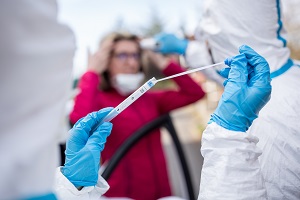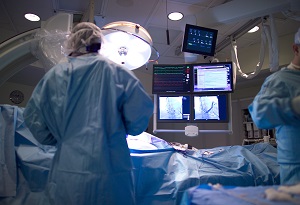January 2021 News Roundup
Help for left-handed docs, prioritizing vaccination for HF patients, remote follow-up care for low-risk acute MI, and more.

Every month, Section Editor L.A. McKeown curates a roundup of recent news tidbits from journals and medical meetings around the globe.
Compared with patients undergoing MitraClip (Abbott) procedures, TAVI patients are at higher risk of having an in-hospital stroke (2% vs 1.1%; P < 0.001), according to an analysis of data from the Nationwide Readmission Database published in the American Journal of Cardiology.
 Minor modifications to exam rooms, cath labs, and elsewhere can go a long way in helping left-handed cardiology trainees to overcome patient positioning challenges, and to master procedural skills and essential workflow activities more quickly, a paper in the Journal of the American College of Cardiology concludes.
Minor modifications to exam rooms, cath labs, and elsewhere can go a long way in helping left-handed cardiology trainees to overcome patient positioning challenges, and to master procedural skills and essential workflow activities more quickly, a paper in the Journal of the American College of Cardiology concludes.
A global meta-analysis published in Hypertension highlights the importance of measuring blood pressure in both right and left arms. The INTERPRESS-IPD investigators found that the higher the difference in blood pressure between arms, the greater the risk of all-cause mortality, CV mortality, and CV events.
Approximately one in five patients with left ventricular assist devices (LVADs) who undergo maintenance procedures for a cardiac implantable electronic device (CIED) experience a complication, researchers report in JACC: Clinical Electrophysiology.
 The US Food and Drug Administration says newly emerging viral mutations of SARS-CoV-2 could elicit false-negative testing results in some instances, though the impact is expected to be minor. In a letter to healthcare providers and laboratory staff, the agency noted that it is monitoring “the potential effects of genetic variation in molecular tests that have received Emergency Use Authorization (EUA) and has been doing so on an ongoing basis throughout the pandemic.”
The US Food and Drug Administration says newly emerging viral mutations of SARS-CoV-2 could elicit false-negative testing results in some instances, though the impact is expected to be minor. In a letter to healthcare providers and laboratory staff, the agency noted that it is monitoring “the potential effects of genetic variation in molecular tests that have received Emergency Use Authorization (EUA) and has been doing so on an ongoing basis throughout the pandemic.”
Patients with acute heart failure have nearly double the risk of dying if they contract COVID-19, a British study published in ESC Heart Failure concludes. Findings from the single-center report “support prioritizing heart failure patients for COVID-19 vaccination once it is available,” the researchers write.
An international analysis of the electronic medical records of more than 1.3 million patients taking angiotensin-converting enzyme (ACE) inhibitors or angiotensin receptor blockers (ARBs) adds more confirmatory data that such patients are no more likely than those not taking those antihypertensive drugs to be diagnosed with COVID-19. Nor are there likely to have worse outcomes if admitted to a hospital for COVID-19, pneumonia, or respiratory issues. The study was published in the Lancet Digital Health.
 From JACC: CardioOncology, patients with stable or active cancers undergoing TAVI have similar periprocedural complications and 30-day survival compared with controls without cancer, a single-center study of more than 1,000 patients treated over 12 years concludes.
From JACC: CardioOncology, patients with stable or active cancers undergoing TAVI have similar periprocedural complications and 30-day survival compared with controls without cancer, a single-center study of more than 1,000 patients treated over 12 years concludes.
Six-month safety events, medication adjustments, and left ventricular reverse remodeling are similar in low-risk acute MI patients regardless of whether their postdischarge care occurs in person with a cardiologist or remotely with nurse practitioners, according to results of the multicenter, randomized IMMACULATE trial published in JAMA Cardiology.
In separate articles in the New England Journal of Medicine, researchers explore the safety and efficacy of the single-dose Moderna vaccine for COVID-19, as well as the two-dose Pfizer/BioNTech vaccine.
L.A. McKeown is a Senior Medical Journalist for TCTMD, the Section Editor of CV Team Forum, and Senior Medical…
Read Full Bio

Comments